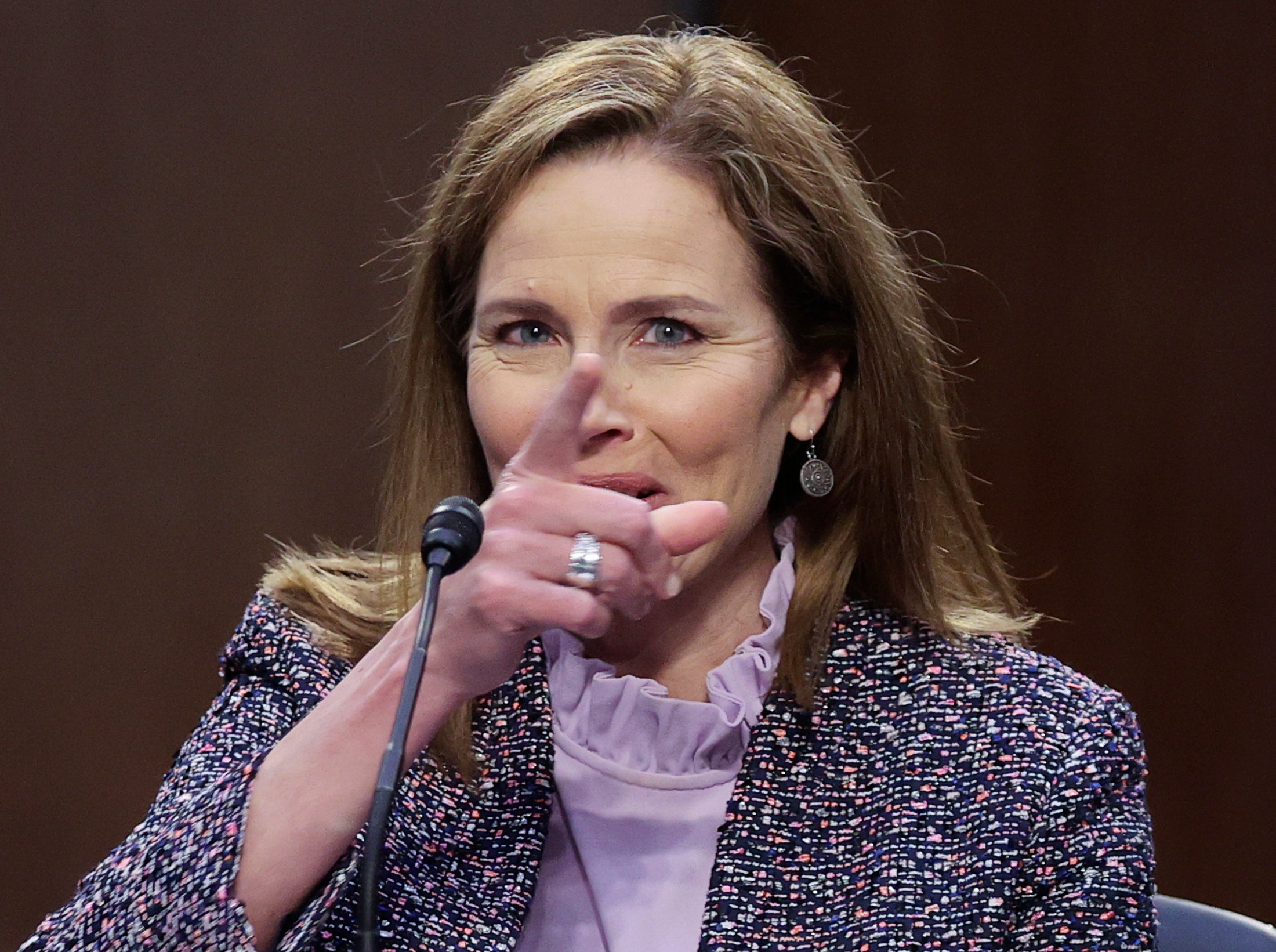For an originalist, Amy Coney Barrett sure seems to struggle with the Constitution
Barrett was unable to say whether a president can defy a court order; whether he can pardon himself; whether he can intimidate voters at the polls; and whether he can delay a general election. For anyone else wondering, these are questions with simple answers


Supreme Court confirmation hearings are notorious for the lack of insight we glean into how future justices will rule. Every time a nominee is selected, we go through the same song and dance of dodged questions about pending litigation, whether they agree with precedent, and other political topics of the day. But this week’s hearing was different. Judge Amy Coney Barrett was even more evasive than past nominees and refused to answer basic, obvious questions, in a turn of events that should leave all Americans concerned.
The answers Judge Barrett refused to give were more revealing than the ones she did. And there was one disturbing constant in her non-answers that didn't involve pending cases: they almost always involved the conduct of President Trump. At times, it appeared she was speaking for an audience of one. So let's dive in.
Led by Judiciary Chairman Lindsey Graham (R-SC), Senate Republicans launched these rushed hearings three weeks before the election instead of focusing on Covid-19 relief. But Covid-19 was still very much present in the indoor hearing room, quite literally, with recently Covid-positive Senators Mike Lee (R-UT) and Thom Tillis (R-NC) delivering multiple maskless speeches.
Throughout these hearings, Democrats repeatedly highlighted the fact that nominating a justice so close to the election is not normal protocol, referring to the process more than once as a "sham." They maintained a laser-like focus on the looming threat to the Affordable Care Act (ACA) in the upcoming November 10 case before the Supreme Court. Through multiple presentations of the personal stories of Americans who rely on the healthcare law, Democrats made the case against overruling it. This largely put Republicans on defense throughout the hearings, while Democrats dissected Barrett’s past legal opinions and personal writings.
Unlike some past Supreme Court nominees, we already know Judge Barrett does not support abortion rights and believes life begins at conception. We already know she believes non-felons shouldn't lose their Second Amendment rights, as well. And we already know that she criticized Chief Justice Roberts for upholding the ACA in the past.
Judge Barrett participated in a moot court, a.k.a mock trial, on the ACA at William & Mary in which she ruled that the Individual Mandate was unconstitutional but that the clause could be broken off from the rest of the law. That provides some insight into whether how she views the severability of the ACA.
Judge Barrett appeared to contradict herself on precedent this week. When asked about Obergefell v. Hodges (gay marriage) or Roe v. Wade (abortion), Barrett said she can't give a thumbs up or thumbs down on specific precedents, but throughout the hearing, she referred to cases like Brown v. Board of Education as "super precedents" that would be unthinkable to overrule. Barrett also wouldn't say whether she felt Griswold v. Connecticut (contraceptive rights) was correctly decided. It became clear which precedents she felt could be overruled and which she didn't.
As the hearings went on, it became clear Barrett was dodging more than just Supreme Court cases. Surprisingly for a self-proclaimed originalist, Barrett appeared to have a very difficult time simply interpreting the Constitution as it was written. She refused to say that certain unconstitutional acts are unconstitutional, and certain illegal acts are illegal, when they related to Trump's conduct.
When Senator Dianne Feinstein (D-CA) asked if the Constitution gives a president the authority to unilaterally delay a general election, Barrett refused to answer and said she would need to hear arguments and go through the judicial process. Barrett said she doesn’t want to be a “legal pundit.” The Constitution clearly indicates the president does not have that power, but Barrett refused to answer, likely because Trump has suggested delaying the election.
When Senator Amy Klobuchar (D-MN) asked if it's illegal to intimidate voters at the polls, Barrett said she can't comment on a hypothetical and can't apply the law to a hypothetical set of facts. The simple answer is yes, it is illegal. Barrett appeared to avoid this because Trump has been openly calling for his supporters to intimidate voters.
When Senator Cory Booker (D-NJ) asked if a President should unequivocally commit to a peaceful transfer of power, Barrett said that she can't express a view and called this a "political controversy." This is not a "political controversy." Trump's refusal to commit to a peaceful transfer of power is wrong and authoritarian. The Constitution is very clear on this.
Senator Leahy repeatedly asked Barrett if a president can defy a court order. Barrett said that the courts have no way to force compliance. Leahy also asked that if that is a threat to the Constitution and checks and balances. Barrett repeatedly dodged. Leahy pointed out that even Justice Gorsuch and Justice Kavanaugh answered that question directly during their confirmation processes and stated a president could not do that. Barrett refused to simply say this, likely because Trump has been openly defying court orders.
When Senator Kamala Harris (D-CA) and other Senators asked if Barrett was familiar with the fact President Trump has promised his next Supreme Court to pick will overturn the ACA, Barrett said she does not "recall seeing or hearing those statements." In this same vein, Barrett said she was unfamiliar with Trump's views on climate change and, when pressed by Harris, would not acknowledge it as scientific fact, saying it's an issue of "public debate." That is likely because Trump has called climate change a "hoax."
When Senator Dick Durbin (D-IL) asked if the president can unilaterally deny the right to vote to Americans based on race or sex, Barrett cited laws indicating that the right to vote is protected and discrimination is not allowed, but when pushed, she refused to directly say the president can’t do so. When asked if mail-in ballots an essential way to vote, Barrett would not say. When asked if a president can pardon himself, Barrett would not say. Do you see the pattern?
Again, and again, and again, Barrett tiptoed around Trump's conduct. It became so blatant that Senator Durbin joked about it during the hearing, saying that if he asked her if gravity exists she might say she can’t answer because it could be a case she might hear one day. Durbin said given all these non-answers, we have no choice now but to believe what President Trump said: Barrett was chosen to achieve his political goals. What other conclusion can we come to than that?
The official committee vote has now been officially scheduled for October 22nd, and Barrett is sure to pass. But the consequences are unlikely to go how Trumpist Republicans imagine. This move will only further motivate Democratic voters and increase the likelihood President Trump loses the presidency and Senator Mitch McConnell (D-KY) loses the Senate majority. Those Republicans sold their soul to President Trump in exchange for engineering a conservative judiciary. They got what they wanted. But will it have been worth it?
Join our commenting forum
Join thought-provoking conversations, follow other Independent readers and see their replies
Comments
Bookmark popover
Removed from bookmarks